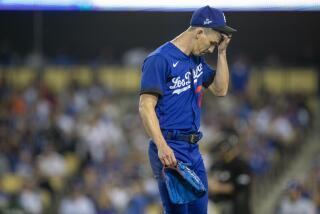Dodgers’ Julio Urias will have shoulder surgery and is out for the season
- Share via
The plan to preserve Julio Urias, a precocious pitching prospect worthy of protection crafted by Dodgers executives, team doctors, members of the training staff and Urias’ own representatives, crumbled inside a triple-A ballpark in Oklahoma City on June 10.
Urias threw a pitch. The anterior capsule in his left shoulder tore. He finished the inning and threw two more. A day later, his shoulder felt stiff. He did not know it yet, but his season was over. The banality of the particulars should not diminish their gravity. A bright future, perhaps the brightest in the organization, has turned cloudy.
Team doctor Neal ElAttrache will repair Urias’ shoulder on Tuesday. Urias will require 12 to 14 months of rehabilitation, according to Andrew Friedman, the Dodgers’ president of baseball operations. Friedman defended the organization’s handling of the 20-year-old Urias, who was the first teenager to pitch for the Dodgers since Fernando Valenzuela, while acknowledging the severity of the injury.
“He had high expectations for helping us win in 2017, as did we,” Friedman said. “That’s taken a significant blow. But our focus now is doing everything we can to get him back as healthy as we can to help us for many years to come.”
For much of these past three seasons, the Dodgers grappled with a conundrum created by Urias. His talent exceeded his physical readiness. He could do things on a baseball diamond that team officials worried his body could not handle. He belonged as a member of the starting rotation; his arm did not possess the stamina to handle the assignment.
The riddle will not end when Urias lands on the operating table. It will become more complicated.
Friedman suggested Urias could pitch in 2018. Yet the history of pitchers who undergo this type of surgery is checkered. Former New York Mets ace Johan Santana was never the same. Neither was former Yankees starter Chien-Ming Wang. Another Yankee, Michael Pineda, missed two major league seasons. The procedure is far less common than an elbow reconstruction like Tommy John surgery.
Friedman admitted he despaired when he heard the diagnosis. His spirits rose after the medical staff provided more detail. A capsule usually ruptures because of overuse. Urias suffered an “acute” tear, Friedman explained, and neither his labrum nor his rotator cuff showed signs of damage. Ample scar tissue is common with this type of injury, but not in Urias’ case, Friedman said.
“Dr. ElAttrache is really confident that we’ll be able to take care of this and get him back to his accustomed level,” Friedman said.
The Dodgers never saw Urias reach that level in 2017. After he posted a 3.39 earned-run average in the majors last season and logged 127 2/3 innings, the team intended for Urias to play a significant role this season. Cognizant of the injury risk, the Dodgers hoped to limit Urias’ innings so he could perform in September and October.
The team delayed his progression during spring training, though he threw at the usual intervals, until the end of March. Urias joined the big league club in late April. He failed to command his pitches, and lost his roster spot in May after walking more batters than he struck out.
The hiccup did not dim the team’s hopes for Urias. He was sent back to Oklahoma City to refine his mechanics. He was monitored closely. Since his professional debut in 2013, Urias has thrown more than 100 pitches in a game only twice.
“As an organization, I just don’t see how we could have handled him with more care,” manager Dave Roberts said.
Yet Urias did not rise to the majors on a straight line. He underwent eye surgery in 2015 and logged only 80 1/3 innings. He shifted from starting to relieving and back to starting in 2016. Urias arrived at Camelback Ranch this spring hoping to break camp as a starter, having prepared all winter for the task. The offseason program meant little for his chances.
Friedman rejected the notion that the Dodgers mishandled Urias. He scoffed at the idea that pitching Urias more would have kept him safe.
“Obviously, there’s a lot of unknowns on what you do on this,” Friedman said. “All of us feel pretty confident that if we didn’t protect him at all over the last couple of years, it could have happened sooner, in a more significant way.”
The Dodgers did not craft the strategy for Urias in a vacuum. The team maintained dialogue with his agent, Scott Boras. Friedman convened with Boras for nearly 30 minutes as the Dodgers took batting practice before Friday’s game against Colorado.
Boras also defended the Dodgers. He described the protection of Urias as a “well-executed, cooperative venture.”
“A lot of times when you have precocious talent, they have such potential in their ability that they can reach [such] levels of execution, velocity and strength that they can literally pull tendons, ligaments off the bones, tear tissue,” Boras said. “You see this with great young pitchers. I mean, this guy could throw 98 mph when he was 16, 17.”
In Urias, Boras continued, “you just have a remarkable talent, who has the ability, in the execution of his fastball, to generate a torque that is so great that the youthfulness of his physiology was not yet capable of withstanding the torque created.”
Perhaps the injury can be distilled into a truism the Dodgers espoused Friday, that throwing a baseball is hazardous to the health of your arm. Yet the organization will not escape scrutiny for the handling of Urias. It will miss him in 2017, and cannot count on him for 2018.
A year ago, no star shined brighter in the Dodgers’ farm system. On Friday, the team revealed Urias’ new, hazier reality.
“Injuries happen in this game,” Friedman said. “There’s nothing we can do to eradicate them.”
Follow Andy McCullough on Twitter @McCulloughTimes
More to Read
Are you a true-blue fan?
Get our Dodgers Dugout newsletter for insights, news and much more.
You may occasionally receive promotional content from the Los Angeles Times.








